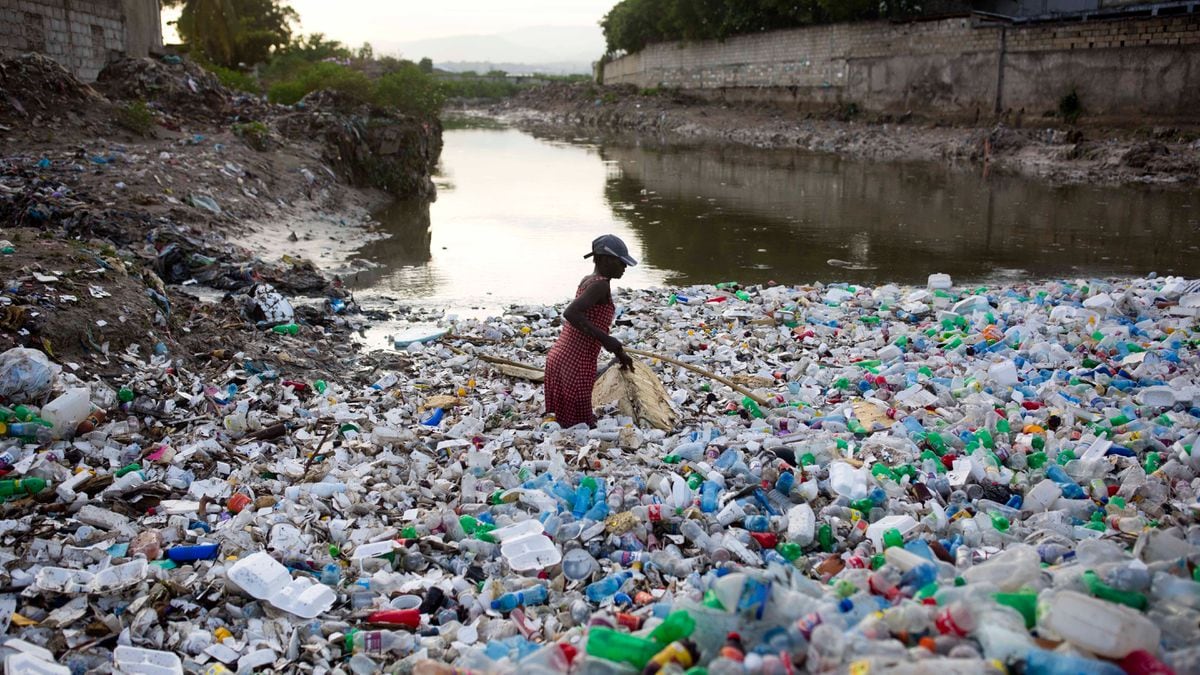Icon: enlarge
Garbage bags in Hamburg: Only around 16 percent of plastic waste in Germany is reused for new products
Photo: Achim Duwentäster / teamwork / imago images
At least in some places it seems to have arrived at the consequences of the immense consumption of plastic for the environment.
There are now numerous initiatives in which plastics are to be dispensed with - for example shops in which the goods are sold unpacked.
But despite the growing climate and environmental awareness of many Europeans, too many plastics are still being produced and consumed.
The European Environment Agency (EEA) comes to this conclusion in a new report.
Due to pictures of protective masks in European waters and large amounts of disposable protective equipment, awareness of plastic waste in the corona pandemic has increased.
Nevertheless, plastics are still too often used as single-use products and thrown away.
A change is now needed to a circular and sustainable approach to plastic use, which can help curb the impact of these materials on the climate and the environment, they say.
"The challenges that plastic poses are largely due to the fact that our production and consumption systems are not sustainable," said EEA Director General Hans Bruyninckx.
The best way to deal with the whole thing is to switch to a fundamentally sustainable and circular plastics economy, in which the materials are reused and recycled much smarter and better.
In addition, the production of plastics from renewable raw materials should be a starting point.
According to the report by the EU authority based in Copenhagen, Denmark, a total of 61.8 million tons of plastic were used in Europe in 2018.
This value seems to have stabilized to some extent, while it is increasing sharply in other parts of the world.
However, Western Europeans used around three times as much plastic per person per year as the global average.
No value was given for Central Europeans.
The EEA report shows three ways in which the plastic problem can be addressed:
Plastics should be used more sustainably.
The circular economy must be supported and expanded.
Renewable raw materials should be used.
As the environmental experts write, the pandemic and climate change have further increased awareness of the plastic waste crisis.
But a lot of plastic is used in the fight against Corona: masks play a decisive role in curbing the spread of the virus.
In many places, restaurants have also been temporarily closed, but they are allowed to offer take-away food - and the disposable boxes used for this are mostly made of plastic.
The same applies to some packaging for online purchases, which consumers increasingly turned to during the pandemic.
All of this could jeopardize the EU's efforts to reduce plastic pollution in the short term, the EEA concluded.
More than a ton of plastic per person
According to a study from last year, only around 16 percent of plastic waste in Germany is reused for new products.
The rest ends up in incinerators or is shipped abroad.
After all, the European Union has severely restricted exports of plastic waste since January 1st.
Only clean plastic waste is allowed to be exported to developing countries for recycling.
Exports and imports to and from countries of the industrial nations organization OECD are also to be more strictly controlled.
In 2019, the EU exported 1.5 million tons of plastic waste, mostly to Turkey and Asian countries such as Malaysia, Indonesia, Vietnam, India and China.
According to data from the Federal Environment and Nature Conservation Germany (BUND) and the Heinrich Böll Foundation, which is close to the Greens, 8.3 billion tons of plastic were produced worldwide between 1950 and 2015.
That corresponds to more than a ton per person who lives on earth today.
Disposable products and packaging make up the vast majority.
From a global perspective, plastic waste in the oceans is a particular problem.
More than twelve million tons end up in the oceans every year.
There the garbage collects into gigantic islands.
In addition, it is ground into microplastic, which is distributed in the oceans and also in marine animals.
Icon: The mirror
joe / dpa








